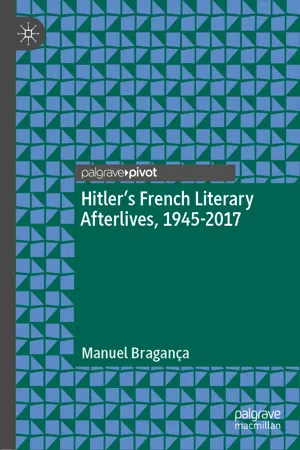I personally find Hitler a detestable figure and despise all that his regime stood for. But that condemnation scarcely helps me to understand.Ian Kershaw, Hitler, 1936–1945 (2000)
This short book is not about Hitler as an historical persona but about his literary doubles in French fiction published from 1945 to the present. Still, the existence of any ‘double’ being intrinsically linked to the existence of an ‘original’ or ‘real’ character (Rosset 1976), and the Second World War remaining a highly ideological and sensitive field of research (Bragança and Louwagie 2018, 299–315), I decided to start this introductory chapter with an epigraph to which I fully subscribe taken from Ian Kershaw’s authoritative biography of Hitler. It will hopefully reassure a minority of colleagues who, at times, appear to find it useless, dangerous or even suspicious to try to understand the perpetrators’ side or read fiction that attempts to do so.1
This book will focus on fiction—seven novels and one short story—for three intertwined reasons. The first one is that fiction, in France, has been the most popular medium used to reflect on the Second World War since 1945: to this day, French novelists have written approximately one thousand novels about this conflict, many of which instantly became best-sellers (Bragança 2014).2 The second reason is that novels, as a genre, allow and perhaps to some extent force their authors to develop their views: indeed, because of their length, novels, even those with strong ideological stances, have to offer some degree of complexity in order to sustain the readers’ interest (Suleiman 1983; Hamon 1984). In other words, novelists who chose to write about Hitler could not simply—and perhaps conveniently—dismiss him as being ‘evil’ as is often the case in everyday speech.3 This is important since, as the historian Ian Kershaw put it, ‘[to] call Hitler evil may well be both true and morally satisfying. But it explains nothing’ (2000, xvii). In fact, one could even go a step further and argue, like the literary scholar Michael Butter, that ‘to call the historical Hitler evil forecloses explanation’ (Butter 2009, 11). Finally, and this will be the third reason, literature and more specifically novels play a key role in shaping collective remembrance and cultural identity (Escarpit 1958; Anderson 1983; Thiesse 2001; Smith 2008) and thus are powerful vectors of memory. This is especially true for best-sellers, on which this study will focus, since these are widely read across classes, genders and communities. If fiction interests and moves readers, it is because it is not created in a vacuum nor confined to the realms of the imaginary but refers to, is influenced by and, through the perspectives and emotions it elicits, influences other cultural and artistic forms as well as political discourses, historical works and, more widely, the prevailing Zeitgeist or ‘spirit of the time’ (see, for example, Escarpit 1958; cf. Schaeffer 1999). The ambition of this book is thus to use fictional representations of Hitler as an entry point to French memories of, and sensitivities to, one of their darkest pages in history.
Hitler’s French Literary Afterlives will focus on fiction and more specifically on characters because these are the main reason why readers engage in fiction—whose only rule, perhaps, is to tell the story of one or several individuals (Erman 2006, 10–13; cf. Schaeffer 1995, 753–763)—and because characters are ideological catalysts and thus key normative signs in any text (Hamon 1984, especially 24–26, 220; Bragança 2012, 22). This is the first book to deal with fictional and cultural representations of Adolf Hitler in a French context, but it should be noted from the outset that it has three direct predecessors. These will be discussed in the conclusion to this volume but a brief mention will be useful here in order to highlight how Hitler’s French Literary Afterlives differs from them. Its first predecessor is Alvin Rosenfeld’s Imagining Hitler (1985), which was the first lengthy study to look at Adolf Hitler in fiction, mainly American and British but not exclusively. Alvin Rosenfeld’s conclusion was that Hitler, in the 1980s, was increasingly being trivialised in fiction, a phenomenon that, he feared, could lead to a trivialisation of the crimes committed by the Nazis.4 The more recent The World Hitler Never Made (2005) and Hi Hitler! How the Nazi Past Is Being Normalized in Contemporary Culture (2014) by Gavriel D. Rosenfeld—Alvin’s son—also deal with representations of Hitler, the first book focusing on alternative histories (or counterfactuals) in the twentieth century and the second on new online platforms as well as scholarship in the twenty-first century. Their alarming tone and content are reminiscent of the aforementioned Imagining Hitler, Gavriel D. Rosenfeld arguing also that the Nazi past is increasingly being ‘normalised’—i.e. trivialised—in contemporary memories, to paraphrase the subtitle of his latest book. Interestingly, France is hardly mentioned even though theoretically included in the scope of Gavriel Rosenfeld’s studies. I will return to some of the caveats of The World Hitler Never Made and Hi Hitler! later in this introductory chapter and again in the conclusion to this volume, but, for now, suffice it to say that Gavriel Rosenfeld would have struggled to find many convincing examples of Nazi ‘normalisation’ in France. Finally, the last predecessor to this book is The Epitome of Evil (2009) by Michael Butter, subtitled ‘Hitler in American fiction’, which analyse...
